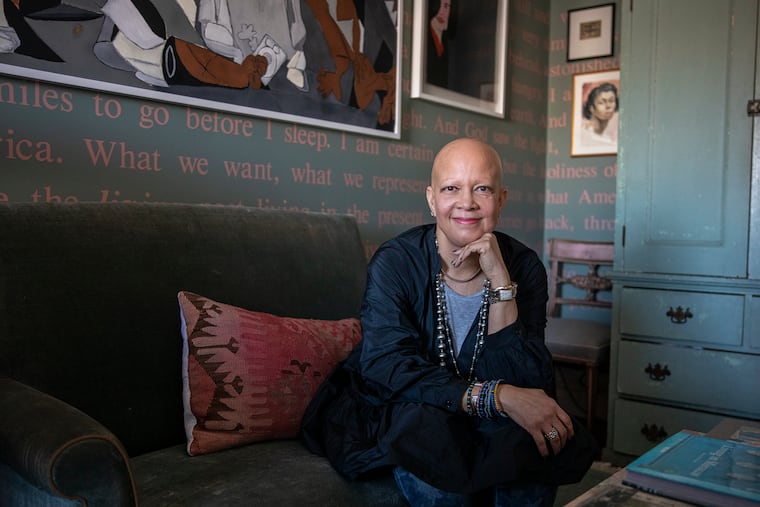Stop talking about The Slap. People with alopecia are the ones who deserve our attention. | Helen Ubiñas
Enough with the commentary about who was at fault at the Oscars, writes Helen Ubiñas. It's time for us to center the experiences of those living with the autoimmune disorder.

This is not a column about The Slap. There’s been more than enough obsessive scrutiny of that.
This is about what has always deserved the most attention: people living with alopecia.
Jeff Woytovich founded the Children’s Alopecia Project in 2004 when his second-oldest daughter, now 24, started kindergarten. Something unexpected began happening around the same time: She started losing her hair.
In many ways, he told me this week, what happened at the Oscars is analogous to what happens to kids with alopecia.
Children, he said, will find themselves being stared at by total strangers who are trying to figure out, “Did they do that on purpose? Do they have cancer? Why don’t they have any hair?” In the process, the person with alopecia becomes secondary to the observer’s feelings and assumptions.
“That’s how I feel when it comes to this,” Woytovich said. “Somebody slaps someone else because of saying something stupid, and we become the sideshow.”
It would be understandable to be annoyed, at the very least, at the misplaced attention. But that’s a luxury that privileged celebrities have. Advocates have to get to work.
» READ MORE: Ayanna Pressley announced she had alopecia, and bald women everywhere exhaled | Elizabeth Wellington
So after moments like Sunday, Woytovich finds himself doing whatever he can to take advantage of the public’s fleeting attention span and put the spotlight on the Children’s Alopecia Project.
If that means fielding countless inquiries from local and national reporters suddenly interested in alopecia by way of The Slap — including me — he’s gracious and game. If that means breaking down what alopecia is — an autoimmune disease in which the body attacks hair follicles — he’ll do it. Whatever it takes to focus some of the attention on his small nonprofit, which is based in Wyomissing, Pa., just west of Reading.
Woytovich, the organization’s only full-time employee, travels all over the country promoting alopecia awareness at schools and local organizations. The group holds 10 camps around the country every year where children with alopecia learn how to support each other. There are roughly 50 support groups around the world and countless fund-raisers to enable this kind of grassroots work.
During the first two weeks of April, Woytovich’s organization hopes to raise $14,000 through its Fill the CAP campaign. But anyone can create a fund-raiser for the organization — even people with high-profile platforms and deep pockets who may want to put their money where, say, their hand or mouth is.
Approximately 6.8 million people in the United States and 147 million worldwide have or will develop the condition at some point in their lives, according to the National Alopecia Areata Foundation.
But experts suspect those numbers are higher, given how many with the condition fail to disclose it.
“It has always been a dark secret among women,” said Lois Arnold, owner of the nonprofit Hairs 2 U wig bank in Queen Village; Arnold also has alopecia. “Some women are balding without even their husbands knowing.”
Some women choose to wear wigs, but others, including Rep. Ayanna Pressley and celebrity interior designer Sheila Bridges, who grew up in Philadelphia, go public about their hair loss.
“It was really difficult as a woman, and it continues to be challenging as a woman navigating life in a society that puts a tremendous amount of value on hair,” Bridges said, adding that the spectacle at the Oscars was a loss for everyone. “The only kind of win of the evening to me is the fact that this” — alopecia — “is back in the forefront again.”
Even Bridges conceded that the attention on her illness probably won’t last for long. So much of the discourse about Sunday night has been dominated by a debate over whether what everyone saw was a protective act of love or yet another example of toxic masculinity.
Not that the world needs one more opinion on that, but here’s where I stand: There are plenty of ways to stand up for others without snatching the spotlight from those that allies (or slap-happy spouses) claim to be advocating for. There are ways to fight without literally raising your hands — as much as you might want to, as satisfying as it feels in the moment, and as unfair as it is for some of the most vulnerable among us to be expected to have thick skin.
On March 14, two weeks before the world fixated on The Slap, a 12-year-old Indiana girl took her life after being bullied for having alopecia.
Her story has received nowhere near the attention it should have. So, I want to tell you a little about her.
Her name was Rio Allred. She loved her family, art, reading, band, camping, kayaking, and playing video games, according to family members. She rooted for the underdog.
While in the midst of grieving their loss, Rio’s family is setting up a nonprofit organization, Rio’s Rainbow, to bring awareness to bullying.
Last week, hundreds of North Side Middle School students walked out in protest of the school district’s handling of other bullying incidents.
“Rio has brought together an army and that army stands for you!” Rio’s grandfather, Jeff Bliler, told the students who participated in the walkout.
The Slap at the Oscars brought together an army, too, with no lack of opinions about people who have the privilege of power and platforms to have their voices and stories heard.
Imagine if even a fraction of that care and consideration instead went toward supporting and protecting all the Rios out there who are suffering alone and in silence.